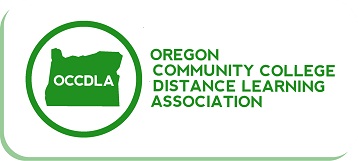Introduction
The Oregon Community College Distance Learning Association (OCCDLA), an association of the seventeen community colleges, strengthens the professional practice and continuous improvement of distance education, eLearning and instructional technology in Oregon through facilitation of an open exchange of knowledge and sharing of experiences.
In June of 2017, the OCCDLA membership voted to continue funding for the full-time operations and support administrative assistant position. This position and corresponding materials and supplies is funded by the Office of Community College and Workforce Development via IGRA 17-166. As denoted in the project proposal, this report reflects on the outcomes of the funding, statewide savings through consortial licensing, and participation in professional development.
Mid-Biennium Accomplishments
In the first year of the 2017-2019 biennium, OCCDLA has made gains in all of its strategic initiatives.
Statewide Collaboration
The OCCDLA association works closely within its statewide membership of the 17 Oregon community colleges and strives to align with the strategic objectives of other higher education affinity groups and organizations across the state.
During this first year of the biennium collaboration with affinity groups included:
- OCCDLA chairpersons attended a January OPC meeting to highlight the work of OCCDLA through the seven strategic initiatives and gather information and resources to help guide future direction with stakeholders.
- OCCDLA chairpersons attended a winter Council of Instructional Administrators (CIA) meeting at Mount Hood Community College.
- During the spring quarterly membership meeting, OCCDLA conducted a joint session with the Oregon Community College Library Association (OCCLA).
- HECC/CCWD representative, Donna Lewelling, provided an update at each OCCDLA quarterly meeting.
Membership Meetings
Since the last end-of-biennium report, June 2017, OCCDLA has hosted a summer retreat and three quarterly statewide meetings at Oregon Coast Community College, Rogue Community College, and Umpqua Community College campuses. A winter quarterly meeting was hosted virtually via Zoom video conferencing.
During seven membership check-in meetings and roughly 33 workgroup meetings video conferencing software, provided through the consortium, was utilized to connect members across the state to work on OCCDLA’s strategic initiatives.
In addition to monthly reporting by the workgroups, topics discussed or presented at the in-person, quarterly membership meetings focused on:
- Grant proposal outcomes – professional development/course quality.
- Chemeketa’s Quality Online Instruction Initiative (QOI).
- UCC’s Professional Development Workshops: Professional Learning Community.
- Promotion of consortial resources among the OCCDLA community college campuses.
- Accessibility – IAAP certification.
- Student completion and retention analytics.
- Improving online completion rates.
- Fall 2018 Completion Conference.
- Films on Demand faculty resources.
- Regular substantive interactions legislation and Title IV audits.
- Instructional standards and best practices in online instruction.
- Net neutrality laws.
- Possible effects on learning management systems and web conferencing platforms.
- OCCDLA position statement on net neutrality.
- Guided pathways and unified statewide transfer agreements (USTA).
- Digital equity and mobile access.
- Evaluating learning management systems.
- Zoom potential for increased storage and bandwidth/Kaltura license.
- Proctor Testing Solutions.
Future topics planned for discussion at upcoming membership meetings include:
- Connecting online programs with student-athletes.
- Future of equity and digital learning.
- Proctor testing solutions and what is being utilized statewide.
- Rural broadband initiative.
- Mobile technology impact on learning and mobile friendly practices in course design
- 24/7 tech support for students/C-RAC guidelines.
Savings Through Consortial Licensing
OCCDLA continues to save money and provide state-of-the-art technology to colleges large and small with consortium pricing. Our estimates for this year’s savings are:
- Films on Demand: $50,000
- AST Captioning: $30,000
- Quality Matters Statewide Subscription: $33,390
- Zoom: $144,000*
- Kaltura: $78,061
- Blackboard Collaborate: $75,000 ($35,000 of savings allowed OCCDLA to pilot BB ALLY accessibility checker)
*Zoom figure does not include savings in travel expenses statewide by using Zoom Web Conferencing. Those savings alone are estimated in excess of $100,000.
Workgroups and Initiatives
Emergent Technology
The Emergent Technology Workgroup (ETWG) evaluates new and emerging technologies that lead to potential consortial agreements and cost savings for Oregon community colleges. This work provides innovative tools and improves opportunities for access to technology for teaching and learning at our community colleges.
During this term, the workgroup finalized the Research & Development exploration grants and presented the outcomes from the last biennium.
Evaluations of emerging technologies included Swivl, Monoprice MP-22 Pen Display Tablet, Arc Media, Interactive Video Quizzing/VPAT, Kaltura video editing tools and Kaltura Interactive Video Quizzing.
The workgroup polled the membership to get a deeper understanding about what the term emergent technology means to individual members and to gather preferences guiding them in future decision-making to focus their efforts. ETWG will be defining partnership paths and shared workgroup processes to improve alignment with strategic initiatives over the course of the second half of the biennium. Future focus includes an Ally pilot and IVQ statewide users group, evaluating proctoring solutions, investigating ePortfolio, a rural broadband initiative, as well as virtual, augmented reality and immersive learning solutions.
Professional Development
State funding during this biennium was limited to providing specific funding to allow participants to attend conferences and to provide the 17 colleges with the statewide Quality Matters subscription. The QM subscription includes access to Quality Matters workshops as well as the QM course design rubric and course review system.
In winter the Professional Development Workgroup discussion centered on goal setting and ways to measure outcomes. They reviewed and updated their objectives and brainstormed ideas to provide training within limited funding. Workgroup lead, Greg Kaminski, provided information on free webinar and workshop resources, including Quality Matters Success Stories and ITC webinars. Members discussed how the QM subscription is being used at the 17 colleges. During spring term colleges created a topics list and began scheduling video conferencing sessions to share how they are utilizing QM and other tools and activities that promote peer sharing and quality course design at their colleges. The group has offered two very informative sharing sessions so far and plans to continue this activity during the next year.
Through CCWD funding colleges were able to participate in these professional development opportunities:
- Treasure Valley Community College staff participated in facilitator training preparing them to offer internal APPQMR or IYOC training at their institution.
- Four Oregon participants attended the February ITC eLearn conference in Arizona.
- This conference included a student panel expressing how access to online was essential to their success.
-
- Chemeketa Community College members presented on their successful Quality Online Instruction initiative.
- OCCDLA members who were not able to attend appreciated the twitter updates tweeted out by their colleagues highlighting topics and presentations from the conference.
- Four participants attended the fall 2017 Quality Matters conference in Fort Worth.
- Last fall 47 participants from nine schools attended the 2017 NW eLearn Conference in Pasco, Washington.
- The 2018 NW eLearn Conference will be in Boise this October.
Quality Matters data for the past year – July 1, 2017, to June 14, 2018
- 227 participated in some type of free or institution funded QM training session.
- IYOC, APPQMR, PRC, QM Success Stories, QMC training, QM rubric update training, and access to resource sites.
- 79 completed workshops.
- APPQMR: 20
- IYOC: 24
- PRC: 4
- There is no state funding for training this year, only the license.
- All workshops in the past year have been paid for by individual institutions.
In discussions evaluating future training opportunities members reviewed the impact of Quality Matters on online instruction.
Instructional Technology Council Leadership Academy Scholarships
- Three Oregon nominees participated in the 2017 ITC Leadership Academy in Portland and gave a collaborative presentation at the OCCDLA summer retreat last August.
- One emerging leader nominated from Central Oregon Community College will be participating in the 2018 Instructional Technology Council Leadership Academy in St. Petersburg, Florida this July through OCCDLA scholarship funding.
In vendor-sponsored training sessions, 22 participants attended one or more fall or winter session Blackboard Collaborate Ultra webinars focused on technology resources. Zoom staff facilitated a kick-off meeting and two administrator training sessions last fall for participants from all 17 community colleges.
Later this fall the OCCDLA Student Completion and Retention Workgroup will host a statewide Completion Conference at Lane Community College in Eugene.
Open Educational Resources
For information on the OER project, the Operations workgroup defers to the corresponding Open Education Resources Librarian Report provided by Amy Hofer, Statewide Open Education Library Services Coordinator.
Accessibility
During the summer and fall, the Accessibility Workgroup incorporated the goal of increasing the use of closed captioning and also expanded access beyond the OCCDLA membership to accommodate a wider audience. The Oregon Accessible Technology Initiative Wikispace was created.
At the start of the biennium, the Accessibility Workgroup established a consortial agreement with Blackboard to pilot their Ally accessibility checker with four colleges. The four schools that participated in the pilot were Blue Mountain, Central Oregon, Chemeketa, and Umpqua.
In winter, Chemeketa reported on the history of grant-funded usage of AST closed captioning minutes among the OCCDLA colleges, highlighting remaining minutes in the consortium. The report included information on workflow integrations available through Automatic Sync Technologies.
Student Completion and Retention/Analytics
At the fall quarterly meeting workgroup lead, Steve Smith presented “The Distance Learning Completion Journey” and introduced the goals of the workgroup. Jenn Kepka was selected as the OCCDLA Completion Conference coordinator. During this term, they have been collecting data from faculty and coordinating conference and networking options focused on strategies, tools and data analytics that have the potential to increase student success. The Fall Completion Conference will be at Lane Community College in Eugene, November 7th. The resulting data from the conference roundtable sessions will summarize strategies and outcomes and will be shared among the conference participants.
Digital Media
This biennium, OCCDLA continued to work collaboratively with The Oregon Community College Library Association (OCCLA) to provide rich digital media of Academic Collections to all 17 community colleges. This partnership supported the continuation of our consortial agreement with Films on Demand which provides a collective cost saving of over $50,000 annually.
OCCLA created a convenient website resource for use in marketing and promotion of Films on Demand. OCCLA member and OCCDLA representative, Christina Trunnell, shared the website in a presentation at the fall OCCDLA meeting. The resources on this site include helpful instruction for faculty as well as other resources geared toward students, librarians, admins and IT staff.
As part of our spring quarterly meeting, OCCDLA conducted a joint session with the Oregon Community College Library Association (OCCLA) collaborating planning for the upcoming 2019 – 2021 biennium. Discussions included a proposal for a digital media workgroup that would compare Lynda.com and Hoonuit Atomic Learning as a possible consortium. OCCLA members presented an analysis and vendor comparison of Films on Demand.
Films on Demand usage statistics among the 17 colleges are posted quarterly on OCCDLA.net.
2018 – 2019 Biennium Expectations
Throughout the next year, OCCDLA will continue to evolve and grow with the constantly changing technology and needs of distance education. Topics planned for future quarterly meetings include innovative ideas for connecting student-athletes to distance education, an initiative increasing high-speed internet access nationwide, equity and digital learning, mobile technologies and course design, 24/7 tech support for students, as well as continued discussions focusing on test proctoring solutions.
Wikispaces closes this summer and OCCDLA’s internal communications and document archives are being transferred to a Google member site. Public communications will continue to be posted on OCCDLA.net
The association’s work will continue to strive to align OCCDLA strategic initiatives with the HECC Strategic Plan, HECC Strategic Framework, as well as the goals of the OPC, CIA, and SSAC. Operational support will evolve to include support functions for the CIA and SSAC.
In planning for the next biennium, and to ensure long-term success, OCCDLA will continue to evaluate our current projects, collaborate within our workgroups and statewide affinity groups, and develop new strategies for student success.

